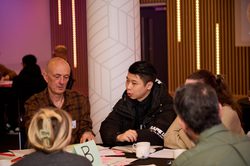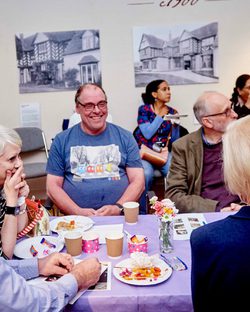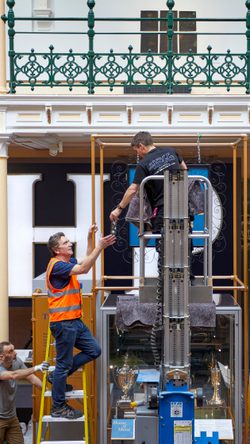Our Strategy: People
Our StrategyAim
As a boldly progressive organisation, increasingly rooted in and porous to Birmingham’s communities, with the skills and culture to engage with our target audiences and the things that matter to them.

Engaging employees and citizens in decision making
Internal example: Embedding our Circles structure.
Birmingham Museums Trust is moving towards a more democratic approach to decision-making and organisational management.
Our Circles are part of a system known as sociocracy, which creates cross-functional teams who are empowered to make decisions in an effective and efficient way.
- We will align the objectives of Circles and departments to strategic aims and activities.
- Circles’ objectives will align directly to strategic aims.
- Departments will have a primary focus on a single aim, alongside objectives that cut across multiple strategic aims.
- Personal objectives and performance management will be linked to these aims.

Audience example: Citizens’ Jury and governance.
Birmingham Museums Trust is moving away from the traditional top-down model, where audiences are expected to be passive and “done to” by the provider.
This process has shown how citizens can be proactively involved in decision-making through a Citizens’ Jury. In this five-year period we plan to:
- Continue to engage the recent jury as we implement their recommendations for Birmingham Museums Trust.
- Run future juries focused on individual sites and collections.
- Explore ways to involve Birmingham citizens in the governance of the museums.
To make this beneficial for BMT, our audience, and the citizens involved, we need to
- Factor in future costs associated with engaging in this way (e.g. Citizens' Jury will require additional external funding).
- Learn from our experience on where power can be shared most effectively, and where decision-making requires the skills, expertise and assets that only Birmingham Museums Trust has (employees, volunteers, collections and sites).

Rebuilding our volunteer base
We will grow a skilled, supported and diverse volunteer community that can advocate for Birmingham Museums Trust and reflects Birmingham’s population.
We have fewer volunteers than before the pandemic and the closure of multiple sites. While this presents a challenge, it also offers the opportunity to rebuild a volunteer community that is representative of Birmingham. To do this, we will create a volunteering strategy focused on building a positive culture and strengthening our overall volunteering offer.
We will foster a positive volunteering culture by:
- Securing buy-in across all levels of the organisation
- Involving employees from the outset.
- Creating consistently positive volunteering experiences.
- Providing volunteering opportunities for staff.
- Ensuring compliance with best practice and legal standards.
We will strengthen our volunteering offer by:
- Understanding our current programme and the demographics of our current volunteer base.
- Setting goals based on our skill and resource needs from volunteering.
- Engaging with underrepresented groups to understand and address barriers to volunteering.
- Designing and testing a range of volunteering initiatives tailored to different audiences.
The result will be:
- Employees who are confident and motivated to work with a wide diversity of volunteers.
- A refreshed set of volunteering offers that, together, build a more representative volunteer community including:
- Local communities
- Underrepresented groups
- Corporate partners

Improving our employee experience
We will continue to roll out improvements that help our employees to deliver a high-quality, inclusive service.
Culture and Health
- Improve and align our HR systems and policies.
- Advance our culture change process and employee deal, reflecting our democratic approach.
- Take a proactive, strategic approach to Equity, Diversity and Inclusion, building considerations and impacts on different groups into our decision making.
- Monitor, manage and support staff experiencing absence or stress.
Performance and Development
- Develop a more equitable and consistent recruitment process.
- Provide a learning and development offer that supports employees throughout their career with us
- Create and roll out management standards and development pathways.
- Improve consistency in performance management.
Organisation Strategy and Design
- Clearly communicate our purpose, strategy and objectives
- Embed our balanced structure and Circles approach, and support teams to work effectively across them.